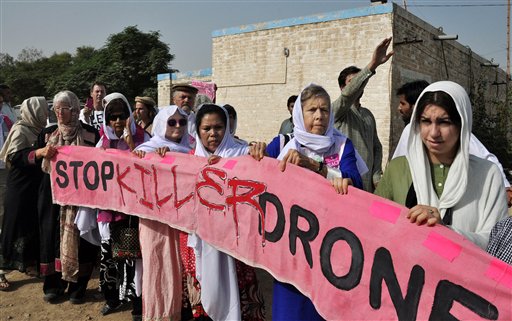ISLAMABAD — Just days after taking power, Pakistan’s new government lodged a protest with the U.S. and summoned a top American envoy Saturday to vent its anger over a U.S. drone strike that was said to have killed seven militants. The move bolstered expectations that Prime Minister Nawaz Sharif’s government will, at least publicly, take a much harder line against such strikes than its predecessor.
Friday night’s drone strike near the Afghan border came just two days after Sharif was sworn in as prime minister and the same day his Cabinet members took their oaths of office. Sharif’s Pakistan Muslim League-N handily won general elections last month and is expected to govern with a strong mandate because it doesn’t need to rely on coalition parties.
Sharif, who wants to pursue peace talks with militants threatening his country, has insisted the U.S. stop the drone strikes, saying they violate Pakistan’s sovereignty and are counterproductive because they stoke anti-American sentiment in this nation of 180 million. Many Pakistanis believe the drone strikes kill large numbers of innocent civilians.
The U.S. insists the CIA-run strikes primarily kill al-Qaida and other militants who threaten the West as well as efforts to stabilize Afghanistan. In a recent speech, President Barack Obama pledged more transparency and restrictions on the highly secretive program, but it appears that for the time being, Pakistan will remain an exception to such plans.
Sharif adviser Tariq Fatemi, acting on the premier’s instructions, summoned U.S. Embassy Charge D’Affaires Richard Hoagland to the Foreign Office on Saturday to complain about the latest drone strike, according to a Pakistani government statement. U.S. Ambassador Richard Olson was out of Pakistan at the time.
“The importance of bringing an immediate end to drone strikes was emphasized,” the Pakistani government statement said. “It was also stressed that these drone strikes have a negative impact on the mutual desire of both countries to forge a cordial and cooperative relationship and to ensure peace and stability in the region.”
A U.S. Embassy official confirmed the encounter but did not provide further details. He spoke on condition of anonymity because he was not authorized to publicly talk about diplomatic discussions.
Issuing the summons so quickly after taking power suggests Sharif wants to quickly carve out as much political space as he can — domestically and in his relations with the U.S. It could be a fairly calculated move in this country, where the powerful military still largely controls security policy, and where political rivals have gained traction by being even more vocal against drones.
While the previous government of the ruling Pakistan People’s Party did, on occasion, summon U.S. envoys over the program, it for the most part stuck to routine press releases denouncing the drone strikes, which have dropped in frequency in recent years. It was also widely believed that many People’s Party leaders privately supported the drone strikes.
Sharif has been far more careful than his People’s Party predecessors in his rhetoric about militancy in Pakistan, and has said he wants to enter a dialogue with the Pakistani Taliban, raising concerns by some in the West that he might be too sympathetic to the Islamist extremists.
In the first such strike following Pakistan’s recent election, a drone in late May took out Waliur Rehman, deputy leader of the Pakistani Taliban. The Pakistani Taliban, who have killed thousands in bombings and other attacks in the country, confirmed Rehman’s death and promptly said they would not talk peace with Sharif.
Sharif — while not naming Rehman or the Taliban — spoke out against that drone strike, and his party in a statement noted that it “regrettably” came after Obama’s speech.
The drone strike Friday night struck a compound in Mangrothi village in the Shawal area, along the border dividing the North and South Waziristan tribal regions, two Pakistani intelligence officials said, speaking on condition of anonymity because they were not authorized to release the information.
The tribal regions are nearly impossible to access for foreign and many Pakistani journalists, so the report could not be independently confirmed. But North and South Waziristan are known to be havens for multiple militant groups, including the Pakistani Taliban.
For all his rhetoric, it remains unclear what Sharif can actually do to prevent the U.S. from using the drones to launch missiles at militants Washington believes are a threat. If he’s unable to end the strikes in Pakistan as the months wear on, that could give more room to opposition politician Imran Khan, the former cricket star, to drain support from Sharif and his party.
Copy the Story Link
Send questions/comments to the editors.



Success. Please wait for the page to reload. If the page does not reload within 5 seconds, please refresh the page.
Enter your email and password to access comments.
Hi, to comment on stories you must . This profile is in addition to your subscription and website login.
Already have a commenting profile? .
Invalid username/password.
Please check your email to confirm and complete your registration.
Only subscribers are eligible to post comments. Please subscribe or login first for digital access. Here’s why.
Use the form below to reset your password. When you've submitted your account email, we will send an email with a reset code.